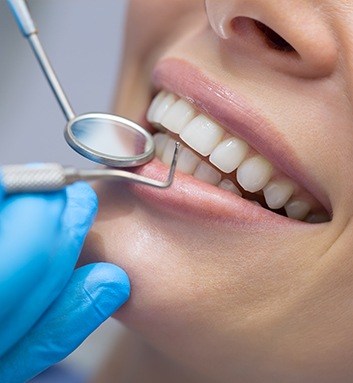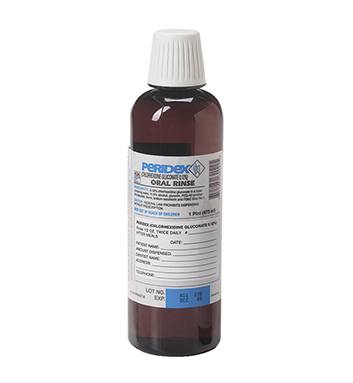Gum Disease Treatment – Fort Smith, AR
Save Your Smile,
Protect Your Gums!

Periodontal disease is a chronic condition that affects the gum tissue and bone under the gums. Swollen, bleeding gums are a major sign of periodontal disease. Good oral hygiene and a healthy diet are two primary factors in preventing the chronic condition -- but if it does develop, take comfort knowing your trusted dentist, Dr. Gilberto López, offers periodontal (gum) disease treatment in Fort Smith.
Periodontal therapy keeps you safe from the harmful side effects of gum disease. Aside from eventually causing tooth loss, the condition has been linked to a number of health issues, including heart problems, respiratory issues, and others. Scaling and root planing heals moderate levels of gum disease.
Why Choose New Smile Dental: Gilberto Lopez, DDS for Gum Disease Treatment?
- Antibiotic Therapy for Improved Outcomes
- Family-Friendly, Spanish-Speaking Dental Office
- Relaxing Dental Office Environment
Scaling & Root Planing

Scaling and root planing is the cornerstone of gum disease treatment at New Smile Dental: Gilberto Lopez, DDS. When dangerous plaque and tartar have reached beneath the gum line, no amount of brushing or flossing can treat it on its own. Scaling is the process of breaking down and removing plaque from enamel behind gum tissue. Additionally, the gums begin to recede as a result of periodontal disease, which is what root planing is for. This treatment smooths out the tooth’s roots, making it easier for them to reattach to the gums after recession. These require three to four visits a year to the dental office, rather than the typical biannual visits.
Learn More About Periodontal Disease
Peridex Antibiotic Therapy

As part of your scaling and root planing treatment, Dr. López also performs antibiotic therapy for those with gum disease. His dental office uses Peridex, which is an oral rinse designed to reduce the level of bacteria inside the mouth. After your scaling and root planing treatment is complete, Dr. López will likely prescribe you antibiotic therapy to promote healing of your gum tissue. Over the next several visits, we’ll confirm if the rinse is working and make adjustments as needed.
Gum Disease FAQs

With millions of adults suffering from some form of gum disease in the United States, it is natural that you would have some questions regarding this common, yet, harmful disease. At New Smile Dental: Gilberto Lopez, DDS, we will answer all your questions and concerns regarding your dental health, especially as it pertains to treatment for gum disease. This is why we’ve compiled a list of frequently asked questions for you to review. Once you are finished, if you have any additional inquiries, feel free to contact us or bring them to your next appointment.
What is the difference between gingivitis and periodontitis?
Gingivitis is what is considered the early stage of gum disease. When gums are red, puffy, and slightly bleeding when brushing or flossing, it is likely that there is some plaque and tartar build-up around your teeth and gum line. With a visit to our office for a thorough cleaning and good oral habits practiced at home, gingivitis can be reversed.
However, if left untreated, it can advance into periodontitis, which is when the gums become severely inflamed, infected, and begin to bleed. When plaque and tartar spread beneath the gum line, pockets can form that can easily trap food particles and bacteria. The only way to combat this issue is with a deep cleaning, otherwise known as scaling and root planing.
What are the signs of gum disease in adults?
Some of the traditional signs and symptoms associated with gum disease include:
- Red, puffy, tender gums
- Bleeding gums
- Inflamed and irritated gums
- Pimple-like sores near the infected site
- Bad breath
- Changes in your bite
- Teeth that appear longer than usual as a result of receding gums
Can kids get gum disease?
Yes, children can get gum disease, and it can range from mild to severe, just like an adult. While gingivitis is the most common form of gum disease in children, it can be easily prevented and treated with the same treatment we would suggest for an adult – regular dental cleanings and good at-home oral hygiene habits.
If periodontitis develops, it is likely it will appear in teens and young adults, as this typically affects molars and incisors.
Is gum disease contagious?
According to the American Academy of Periodontology, it is highly unlikely for gum disease to be contagious, as it occurs as a result of bacteria living beneath the gums that causes inflammation. However, because the bacteria living in your mouth can be easily spread through saliva, it is advised that you avoid sharing silverware or coming into contact with another individual’s saliva while being treated for periodontal disease (gum disease).
How can someone prevent gum disease?
In order to prevent gum disease from occurring, these are some tips you should follow:
- Brush your teeth with a soft-bristled toothbrush and fluoride toothpaste twice a day for two full minutes.
- Gently floss between your teeth at least once a day.
- Use mouthwash to rinse away bacteria and food particles left over from brushing and flossing.
- Continue to see us for regular dental checkups and cleanings every six months. If you are a periodontal patient, you will need to see us more frequently (i.e. every three months)
- Avoid eating too much sugar or starch, as both can lead to bacterial breeding, resulting in tooth decay and gum disease.
- Quit smoking
